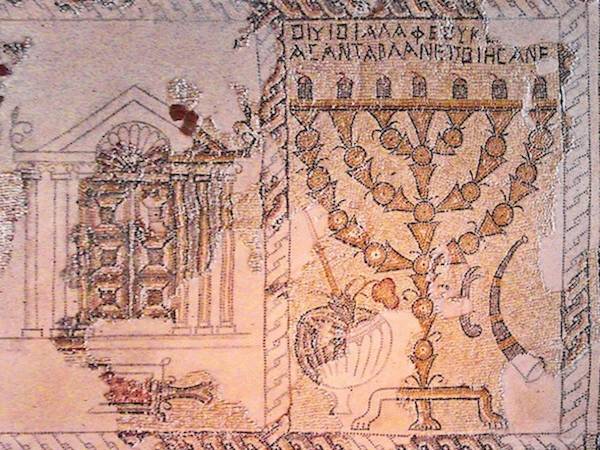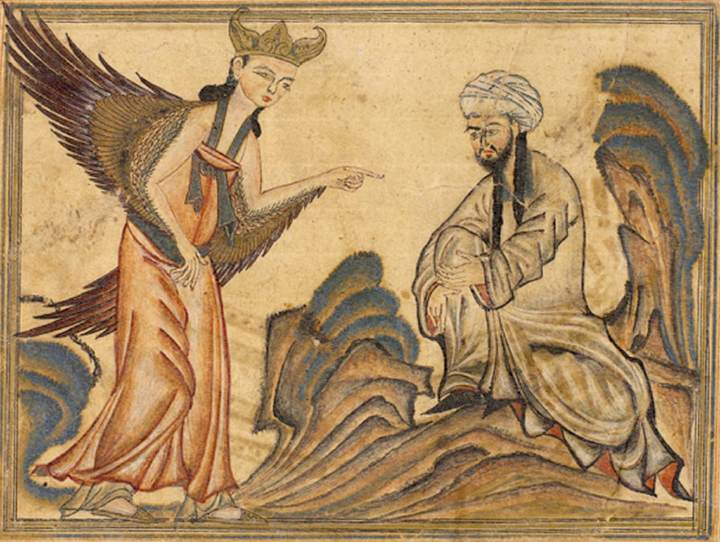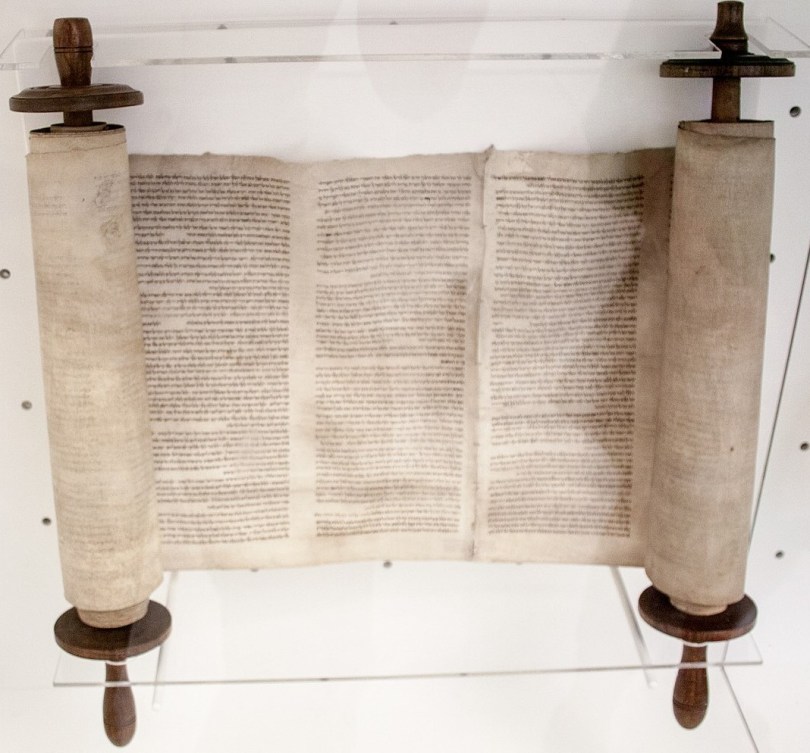Weaving one tale inside another
The Jewish Bible is a great book, apart from the parts that lay out the Jewish religious law in too much detail to keep the readership entertained. It features tales about the Jewish patriarchs Abraham, Isaac, and Jacob. And, Moses led the Israelites out of Egypt to the Promised Land under the guidance of a wrathful cloud. It is nearly all made up. Writing and editing the Jewish Bible took centuries. And they wrote it for religious purposes rather than producing an accurate account of what transpired. That is how historians look at the Jewish Bible. If you believed it all, do not blame the Jews for writing good stories but for your gullibility. You also do not think reptiles live among us because scriptwriters in Hollywood made a film in which they do, or do you?
What does the almighty owner of quadrillions of galaxies have to do with the Jewish Bible, a product of the fantasies of a petty nation dwelling in a small land on a tiny planet near an insignificant star inside one of those galaxies? To answer that question, imagine you are John Ronald Reuel Tolkien writing tales about Hobbits. You can write a story about someone who makes up a story about you. Tolkien could have written about a Hobbit writing about his creator Tolkien. And by the way, the Shire might be an insignificant spot in an infinitely large universe, but Tolkien hardly cares about the rest of the universe. Only the Shire and those Hobbits have his interest.
If Tolkien can do that, God can do it too. If God is a woman and has been among us as Mary Magdalene, what roles did God play among the Jews? In other words, which women in the Jewish Bible were God in disguise? Inquiring minds want to know. Most of these stories are fantasy. Hence, the first question you should ask is: can God have played roles in stories that never happened in the story? Tolkien can write a story in which a Hobbit writes a story in which Tolkien enters the Shire disguised as a Hobbit. But that story never happened in the story Tolkien wrote. It is a story a Hobbit wrote in that story. And what about the Hobbits starting a religion with an imagined creator? And then the truth comes out, Tolkien reveals himself, and the Hobbits all laugh. So it can be done. And indeed, strong women, who could have been God in disguise, appear in the Jewish Bible.
Hiding it behind human motivations
There is another reason why powerful women appear in the Jewish Bible. The Israelites were too few in numbers and were too weak to defend a territory. They had to survive as a minority in the lands of others. Military adventurism would be fatal for them. To that aim, the authors of the Jewish Bible invented a new type of hero. Rather than valiant warriors, their heroes were virtuous people who helped others like Boaz,1 people with weaknesses like David, and risk-averse shrewd people. Abraham was not a courageous warrior, nor was his son, Isaac. Cunning had to compensate for that. Jacob cheated on his brother Esau and took his birthright. Meet the Jewish hero. He has no honour, lacks the courage to defend his wife and defrauds his brother. But luckily, he has God on his side.
Heroes die, but the cunning and cowardly remain alive. That is why there are still Jews while other nations made a one-way trip to the dustbin of history. And so, the authors of the Jewish Bible also refashioned the role of men and women in family life. The stories of Jewish patriarchs were about family life and domestic affairs where women had a central role. And women played a crucial part in Jewish victories. That undermined male authority in war. In several cases, women achieved triumph on the battlefield or determined the fate of men.1 Jacob defrauded Esau of his birthright and deceived his father, Isaac, with the help of his mum, Rebecca. Esther saved the Jewish people from a plot in the Persian court. The Jewish Bible does not depict events suggesting Rebecca or Esther could have been God in disguise. But there are a few other stories that catch the imagination and qualify. There was something special about Sarah, the matriarch of the Jews.
Sarah and Abraham
The Lord allegedly promised Abraham that one day, his offspring would be as countless as the stars and own the land between Egypt and the Euphrates River. But his wife, Sarah, was barren, so she ordered Abraham to sleep with her slave Hagar so Hagar would bear a child in her name. Those were the days when slavery was still legal, and you could get away with that. Once Hagar was pregnant, she began to look down on Sarah. Sarah then mistreated Hagar, and she fled. But God sent an angel, the famous Angel of the Lord, who in Christian thinking might be Jesus but did not say he was, who ordered Hagar to return and submit herself to Sarah. Hagar bore Abraham a son, Ishmael.
That could have been good enough, but the Lord chose differently and presented a covenant to Abraham. It required the circumcision of all the males. Sarah was to become the matriarch of the Jewish people. At the time, Abraham was one hundred years old, and Sarah was ninety. Abraham and Sarah laughed when they learned this. Remember, 4,000 years ago, there were no erection enhancement pills or fertility treatments. Sarah became pregnant and bore Isaac.
Like in most traditional agricultural societies, Jewish religious law prescribes that men precede women in inheritance. Daughters can only inherit if there are no sons. Nevertheless, being a matriarch of the Jewish people is most significant because you are a Jew if your mother is one. Your father is irrelevant to your Jewishness. God was particularly picky as to who was to become the matriarch of the Jews. In this sense, the Jews are not primarily children of Abraham, as the Jewish Bible says, but children of Sarah in the same way Christians are children of God.
Abraham feared for his life because of Sarah’s beauty. When the Egyptians asked if Sarah was his wife, he said she was his sister. And so, the Pharaoh’s servants took notice and informed the Pharaoh, who took her as his wife. For that reason, God inflicted severe diseases on Pharaoh and his household. That is divine justice. God punished the Pharaoh because Abraham had deceived him. With a God like that, you don’t need Satan. Not surprisingly, that horned fellow was nowhere to be found in this tale. Perhaps he enjoyed a sabbatical. The Bible does not tell. Abraham did the same in Abimelech’s kingdom, thus knowingly bringing Abimelech in mortal danger. King Abimelech then received threats from God after he planned to take Sarah as his wife. Luckily for him, God didn’t have a bad mood that day.
To us mere mortals, an intriguing question might be, what made Abraham worthy in the eyes of God? Is it that he intended to sacrifice his son when a voice asked him? If it had happened today, they might have locked up Abraham in a mental ward. If Abraham was God’s husband, it could make sense. In any case, God works in mysterious ways, and a ram presented itself, and that same voice then asked Abraham to sacrifice the animal instead. That was a narrow escape. If that ram had not been there, there would have been no Jewish people, and world history would have been entirely different. That is chaos theory at work here, or is it God?
In family matters, God sided with Sarah. The Angel of the Lord summoned Hagar to return to her mistress, Sarah. Later, God told Abraham to send Hagar away when Sarah wanted this. Sarah became the matriarch of the Jews because the Lord commanded. The Lord thus represented her well. Had this been a scrap of history, Sarah might have been God in disguise and have done an excellent job hiding that. But God can also play undercover roles in events that never took place. That is a perk of writing the story yourself. And why does God desire bits of male reproductive organs in exchange for making a covenant? That is indeed most peculiar unless the Lord is a Lady. Even then, it seems quaint to me, but perhaps I do not understand women and their fantasies well enough.
Joseph and Asenath
Jacob had twelve sons, but Joseph was his favourite. His brothers conspired against him and sold him as a slave. Joseph ended up in the household of Potiphar, an Egyptian and one of Pharaoh’s high-ranking officials. Joseph did well there and became Potiphar’s favourite. Joseph was well-built and handsome, so Potiphar’s wife wanted to sleep with him. When he refused, she accused Joseph of trying to seduce her, and Potiphar put him in prison. There, Joseph became the prison warden’s favourite. Joseph was apt at explaining dreams. That eventually brought him to the Pharaoh, whose favourite he became also. The Pharaoh made him a Viceroy and put him in charge of the granaries.
Joseph is one of the Jewish patriarchs, but he married Asenath, the daughter of an Egyptian high priest. The Jewish Bible tells us nothing about her, but people may have had second thoughts about this arrangement as marrying pagans was a controversial matter. A later story about their marriage explains how Joseph, after he escaped Potiphar’s wife, ended up in the bed of a pagan priestess. According to this tale, Asenath was proud and despised men but became impressed by Joseph’s looks.
Joseph first did not want to marry a pagan priestess who bowed before idols and did not worship the God of the Jews. Asenath showed repentance and changed her faith. An angel from heaven came to her chamber to bless the marriage. When Asenath told Joseph of the angel, he changed his mind and married her. Asenath’s change of faith appears insincere and induced by her desire to marry Joseph. Nevertheless, God blessed the marriage. Asenath might have been God in disguise if only this had actually happened.
Zipporah and Moses
A fellow named Moses allegedly led the Israelites out of Egypt. A burning bush claiming to be God commanded Moses to return to Egypt to free the Israelites. Moses then took his wife, Zipporah, and sons and started his journey to Egypt. On the road, they stayed at an inn, where that same burning bush supposedly came to kill Moses, which is a reason why you should not believe it happened. Zipporah saved Moses’ life by circumcising their son and touching Moses’ feet with the foreskin, saying he was her bridegroom of blood (Exodus 4:24-26). Later, the burning bush allegedly successfully transformed itself into an ireful cloud of fire that helped Moses lead the way into the Promised Land.
Zipporah saving Moses’ life in this way fits the supposed agenda of the authors of the Jewish Bible, which is to undermine male authority so Jewish men would not strive to posthumously get the prestigious Darwin award for their adventures and terminate the Jewish people in the process. After all, the success of Moses’ mission depended on Zipporah having rescued him from the consequences of his daring attempt to let his son remain uncircumcised. God somehow was particularly keen on that foreskin. Zipporah knew what God was about to do and the reason why. But Zipporah reading God’s mind? No mere human could accomplish such a feat, not even Jesus. Hence, Zipporah might have been God in disguise if only this had happened.
Bathsheba and David
Bathsheba, who also was the wife of Uriah, broke David and his kingdom. While Uriah served in the army to fight one of David’s wars, Bathsheba conspicuously bathed on a rooftop near the royal palace, where David could see her naked. She may have planned to seduce him. The alternative explanation, that there was no room inside the house to bathe, appears less convincing. David ordered Bathsheba to come to his place. And so She did, apparently without even saying it might be a bad idea. She became pregnant after sleeping with him. David then commanded Bathsheba’s husband, Uriah, to go home, hoping he would sleep with his wife so the scandal would go unnoticed. But Uriah did not out of solidarity with his comrades on the battlefield. David then asked his commander to place Uriah on the frontline of the battle so he would die. After Uriah died, David married Bathsheba. Bathsheba turned out to be a true fate changer. She also bore the future king Solomon.
You might have heard that the Lord loved David. And if you have not, you might qualify for an ear transplant. But the subsequent course of events did not demonstrate that. From then on, everything went downhill. In hindsight, this sequence of incidents brought the son of Bathsheba to the throne. The prophet Nathan foretold David that his act cursed his house. David’s eldest son Amnon was murdered by his half-brother Absalom after he had raped Absalom’s sister Tamar. Later, Absalom declared himself king and started a revolt against David, in which David’s troops killed him. That eliminated two potential heirs to the throne. In David’s old age, Bathsheba secured the succession to the throne of Solomon. The marriage was a grave sin, but God nevertheless loved Bathsheba’s son, who was to become king. Thus, Bathsheba could have been God in disguise.
That might explain why the Lord loved David so much, as it cannot be due to his superior moral virtue. And it presents us with a reason why he could not resist Her. David is a historical figure, so there could be truth to the story. It also fits the agenda of the authors of the Jewish Bible. Even Israel’s greatest king, David, had faults and crumbled in the hands of a woman. And no one would ever have thought Bathsheba had something to do with the angry cloud dwelling in that tent. Remarkably, the name Bathsheba consists of two parts, Bath and Sheba. Bathsheba seduced David by bathing naked on a rooftop near the palace. The Queen of Sheba later visited Solomon. That is a bit odd. Hence, the Queen of Sheba may also have been God in disguise. Thus, the pun may be intentional even though the Hebrews missed it due to the constraints of their language.
Deborah, the founder of the Jewish nation
Sarah is the fictional matriarch of the Jews. The real Mother, insofar as anything is real in this fictional world, can be extracted from the texts in the Jewish Bible with the help of historical analysis. The Jewish nation gradually emerged after Egypt retreated from Canaan around 1150 BC. That left a power vacuum in which states gradually developed from tribal leadership. It corresponds with the tribal era of the judges in the Bible. The oldest part of the Jewish Bible likely is the Song of Deborah (Judges 5). Historians believe it dates from that era. As the story goes, Deborah was a tribal leader during this age.
Deborah was the fourth judge in the Book of Judges, but the remainder of the book dates from centuries later and could be largely fictional. Only Deborah may have lived in that era in that role. If you take that view, the Song of Deborah is the starting point of the Jewish Bible. The song likely did not pop up out of nowhere. Jewish tribespeople could have composed it to celebrate the victory brought by their heroine, Deborah. She could be the earliest historical person in the Bible. She attributed the triumph to the Jewish deity Yahweh, so the history of the Jews as Yahweh’s people might have started with Her.
She took part in a battle (Judges 4:8-9). As the story goes, Deborah sent for Barak, the commander of the troops, and said to him, “The Lord, the God of Israel, commands you: ‘Go, take with you ten thousand men of Naphtali and Zebulun and lead them up to Mount Tabor. I will lead Sisera, the commander of Jabin’s army, with his chariots and his troops to the Kishon River and give him into your hands.'” (Judges 4:6-7) But it was Deborah who commanded Barak. And so, She might have been the God of Israel in disguise and founded the Jewish nation and religion in person.
Latest revision: 11 November 2023
Featured image: Sepphoris Mosaic. Pbs.org. [copyright info]
1. Wright, Jacob L. (2014). The Bible’s Prehistory, Purpose, and Political Future. Coursera.





